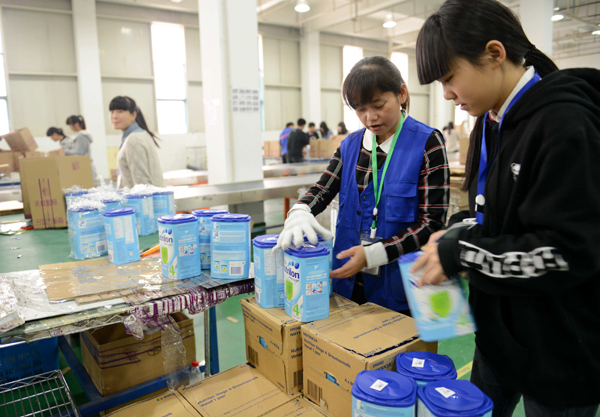Rate hike ends tax-free era for cross-border e-commerce business
Updated: 2016-04-09 09:11
By Li Yang(China Daily)
|
||||||||
 |
|
Overseas goods sold on Tmall, the online marketplace, being packed for shipment in China at the Hangzhou Cross-border Trade E-commerce Industrial Park on Tuesday. [Provided to China Daily] |
China adjusted the tax structure for retail goods imported by e-commerce companies from April 8, replacing the luggage and postal taxes with added-value tax, consumption tax and customs duty. The tax on foreign infant formula and paper diapers, for example, will increase by about 12 percent, and that on golf equipment and luxury watches will become twice as high.
This essentially means consumers have to bid farewell to the de facto tax-free era of cross-border e-commerce and pay more for foreign goods.
The heavier tax burden will crush some small e-commerce companies and probably lead to a reshuffle of the sector whose boom started in 2014 because of low tax. The change in the tax structure reflects the government's resolve to boost domestic consumption.
Consumption contributed 60 percent of China's economic growth last year, when the total retail sales of consumer goods was 30 trillion yuan ($4.62 billion), second only to the United States. And the contribution of e-commerce to that amount was more than 4 trillion yuan, the highest in the world, according to the Ministry of Commerce.
In recent years, China's online retail sales have grown at a remarkable average speed of 50 percent a year, becoming a robust driver of overall economic growth. The tax hike is to make consumers refocus on the domestic market, because 2015 saw a sharp increase in both the number of consumers and the amount of money they spent.
China E-commerce Research Center's statistics show cross-border e-commerce transactions reached about 4 trillion yuan last year, up 42.8 percent year-on-year and accounted for about 17 percent of the total import-export value. About 24 million Chinese consumers spent about 240 billion yuan to purchase foreign goods through cross-border e-commerce platforms. And by 2018, 35.6 million consumers are expected to spend 1 trillion yuan to purchase goods on these platforms.
Amazon (China)'s report on cross-border e-commerce in 2015 shows the money domestic consumers spent to buy foreign goods through its website in the first 10 months was equal to the total sum of the past 20 years. So if China continues its almost tax-free policy in this sector, more of its national wealth will flow into the United States, Japan and the Republic of Korea, the three most favored destinations of Chinese consumers for foreign goods.
- Global health entering new era: WHO chief
- Brazil's planning minister steps aside after recordings revelation
- Vietnam, US adopt joint statement on advancing comprehensive partnership
- European border closures 'inhumane': UN refugee agency
- Japan's foreign minister calls A-bombings extremely regrettable
- Fukushima impact unprecedented for oceans: US expert

 Stars of Lijiang River: Elderly brothers with white beards
Stars of Lijiang River: Elderly brothers with white beards
 Wealthy Chinese children paying money to learn British manners
Wealthy Chinese children paying money to learn British manners
 Military-style wedding: Fighter jets, grooms in dashing uniforms
Military-style wedding: Fighter jets, grooms in dashing uniforms
 Striking photos around the world: May 16 - May 22
Striking photos around the world: May 16 - May 22
 Robots help elderly in nursing home in east China
Robots help elderly in nursing home in east China
 Hanging in the air: Chongqing holds rescue drill
Hanging in the air: Chongqing holds rescue drill
 2.1-ton tofu finishes in two hours in central China
2.1-ton tofu finishes in two hours in central China
 Six things you may not know about Grain Buds
Six things you may not know about Grain Buds
Most Viewed
Editor's Picks

|

|

|

|

|

|
Today's Top News
Liang avoids jail in shooting death
China's finance minister addresses ratings downgrade
Duke alumni visit Chinese Embassy
Marriott unlikely to top Anbang offer for Starwood: Observers
Chinese biopharma debuts on Nasdaq
What ends Jeb Bush's White House hopes
Investigation for Nicolas's campaign
Will US-ASEAN meeting be good for region?
US Weekly

|

|







